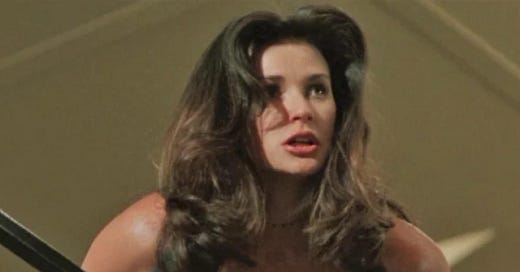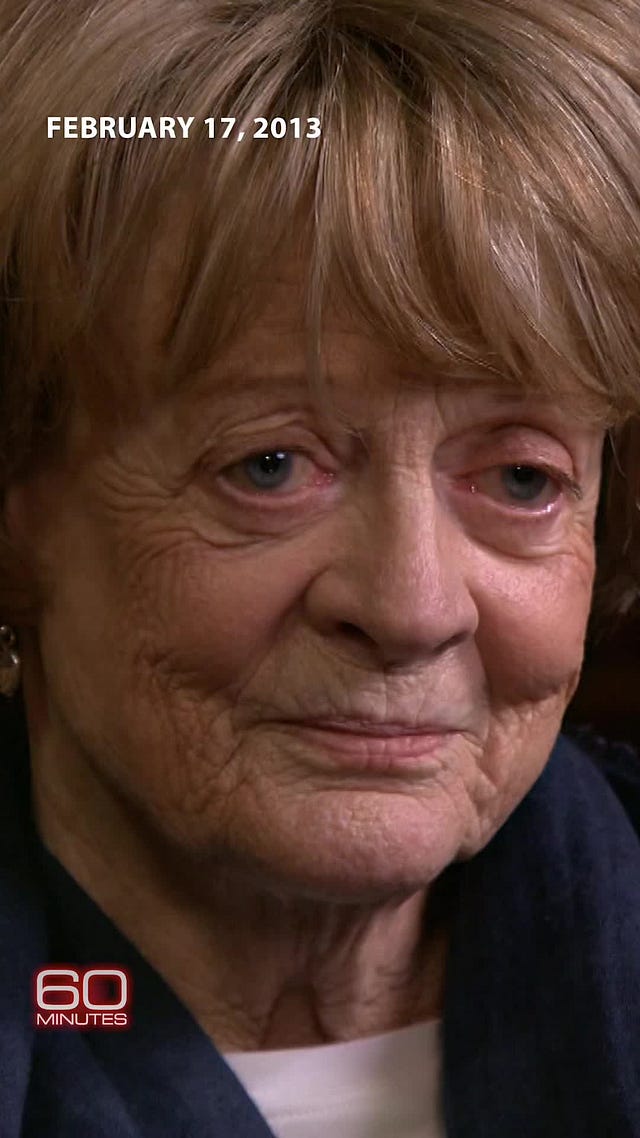Hello friends and enemies,
It’s officially 24Q4 which is totally frightening. Feels like it should still be May or at the very least August. Time STOP!!
I haven’t posted a viewing diary in a couple of weeks because 1. seeing Megalopolis in addition several urgent and unforeseen happenings in my professional and personal existence on this planet caused me to go certifiably insane for roughly two weeks and 2. I struggle with multitasking and lately I’ve been ass deep in editing the sizzle reel for my feature film. I’m nuts and busy!
But my mind has now healed (probably just temporarily—my heart and soul still operate on the extremes of human emotion) so let’s get caught up. I’m not going to get into every single thing I watched because it’s been just so long and I watch a lot of movies.
Here are all the titles I’ve watched of late that I am not going to write about because I either plan on writing about them more in depth in later posts, or because this post is long enough and I don’t have anything interesting to say. Rewatches are asterisked.
Megalopolis (2024, Francis Ford Coppola)*
Detour (1945, Edgar G. Ulmer)*
The Childhood of a Leader (2015, Brady Corbet)
The Lair of the White Worm (1988, Ken Russell)
The English Patient (1996, Anthony Minghella)*
G.I. Jane (1997, Ridley Scott)
Vox Lux (2018, Brady Corbet)*
Celebrity (1998, Woody Allen)*
Unfriended (2014, Levan Gabriadze)*
The Brutalist (2024, Brady Corbet)
Othello (1965, Stuart Burge)
Anyway, we have some eulogizing to do: a couple years ago, I declared that I have a Mount Rushmore of elder British actresses (with five giant stone heads instead of four). After Maggie Smith’s passing two weeks ago, we are now down to only three still living. [The Virgin Suicides voice] Glenda Jackson was the first to go. Now we only have Judi Dench, Julie Christie, and Vanessa Redgrave.
On the day of Smith’s passing, a friend asked me, do you think British actors are inherently better actors than American, and I said, no, of course not; British actors are typically more classically trained which might make their process more rigorous and disciplined, but ultimately the only thing that matters is what ends up on screen or stage.
What makes these women worthy of a fictional mountain carving monument in my mind is not their national heritage but the fact that they were at the forefront of a generation leading a cultural revolution in Britain—British New Wave cinema is usually taught as a footnote to the French New Wave, though its influence on the American New Hollywood is just as important.
The British New Wave, which introduced directors like Tony Richardson, Ken Russell, Karel Reisz, Jack Clayton, Ken Loach, and John Schlesinger, and actors like the five aforementioned women, Albert Finney, Alan Bates, and Richard Harris, was like nothing ever before seen in English-language pictures. But this postwar artistic movement wasn’t limited to the cinema—the national theatre was turning out playwrights like Joe Orton and, of course, future film director Mike Leigh.
For decades—centuries—the British cinema and theatre had been dominated by comedies of manners, Shakespeare, plays from ancient Rome and Greece, etc., most of which portray the wealthy as fully rounded human beings while portraying working class people as little more than horny buffoonish stereotypes for comic relief. But postwar British writers, actors, and directors gave voice to the average British person and their hopes and fears, their friendships and their passions. Let the aristocracy
In the early 1960s, the nascent independent cinema movement in the United States had hardly broken through and these were the first English-language films of the postwar era that crashed into cinemas and spoke of the coming counterculture, the sexual revolution; these films let average people be gods and monsters, they portrayed different sexual orientations with honesty and empathy, they had an implicit subtext of political violence between the classes.
The British New Wave was a more middlebrow movement than the French New Wave, with strong narratives and beautifully rendered character arcs, which made it incredibly palatable to the average British or American moviegoer. So, while French New Wave’s formal influence could be found in American cinema, the Brits themselves came to dominate Hollywood in the years to come
Maggie Smith, born in East London, was one of the first stars to break through, when her Desdemona in Othello on the West End was filmed for cinematic exhibition; I watched the film for the first time this week, and when (spoiler alert for 400 year old play!) Othello kills Desdemona, I felt in her a genuine fear, resignation, and sadness, mostly channeled in between Shakespeare’s words, solely through her eyes, and the tiniest exhalation of breath as he smothers her. A towering talent for her entire career.
But now, for the other movies I’ve watched lately:
Tea with the Dames (2018, Roger Mitchell)
Rewatched when I couldn’t sleep on the night of Maggie Smith’s passing. I thought I would just watch it until I fell asleep but I watched the entire thing. The joke that has stuck with me this time is Eileen Atkins saying that Alan Bates complained to her about doing Antony and Cleopatra and Maggie Smith goes, “well, that’s because he wanted to play Cleopatra.” I love when old women do homophobia! I was really laughing.
The Prime of Miss Jean Brodie (1969, Ronald Neame)
I’ve seen this movie probably five or six times in my life and I love it dearly every time. Maggie Smith, in her first Academy Award-winning role, is a tower of strength as Jean Brodie, so closed off from intimacy that a desperate sense of unreality boils just beneath the surface. Smith never hits the cracks in Jean’s persona particularly hard, her love for fashion and her desire to control the futures of both her colleagues and students are presented without remark, simply a small buildup of important details, so that when her delusions are finally brought to bear, there is nothing to do except sit in rapt silence and watch her suffer.
Striptease (1996, Andrew Bergman)
This is the movie that the haters of Showgirls think Showgirls is. Demi Moore, as usual, puts her whole pussy into the work but she was left totally adrift by the director named “Andrew Bergman,” whoever that is. Moore’s character is in an updated version of Stella Dallas while everyone around her is in Raising Arizona. Jarring and stupid.
The Patriot (2000, Roland Emmerich)
I’ve seen this movie so, so many times. You actually have no idea. One of those movies we used to rent as a family so much that we eventually just purchased the DVD. Daniel came over and we were supposed to watch two Shelley Winters supporting performances (The Great Gatsby and A Double Life) but we had both had frustrating days and I had recently purchased Roland Emmerich’s The Patriot on 4K UHD disc. We had no choice, ultimately. We stan the mute daughter! She’s everything.
Seven Brides for Seven Brothers (1954, Stanley Donen)
I’ve seen this movie quite a few times before but I learned in the past year that they made two versions: the A-version was the CinemaScope version and the B-version was regular flat widescreen, which they made because not every theater was set up with CinemaScope capabilities yet. This required them to shoot every scene multiple times with different cameras, so they really are fully two different movies, completely different takes in each; I watched the widescreen version for the first time two weeks ago because I wanted to see if I could tell the difference. I couldn’t.
The Juror (1996, Brian Gibson)
One of the unintentionally funniest movies I’ve seen in my life. I could not believe what I was witnessing. Alec Baldwin is a mafia hitman who blackmails Demi Moore (who begs to do her duty as a member of the jury even though she is a single mother and “aspiring sculptress,” even after the judge is willing to dismiss her) into getting a Not Guilty verdict on the trial of mafia don “Louie Boffano.” Naturally, Baldwin falls in love with Moore as the stakes grow. Moore and Baldwin both give performances so bad that can only be called performance art. James Gandolfini gives a remarkably empathetic performance (likely thing for him to do…) as one of the other mafia henchmen, who feels for Moore and hates what he has to do to her. I miss him. (Noticed as I was cleaning this post up to publish I originally unconsciously wrote “Demi Moore” as the film’s director. Probably would have been a better movie.)
Joker: Folie à Deux (2024, Todd Phillips)
I thought it was better than the first one. a movie I loathed from start to finish. This one had songs. They were totally superfluous, but they were present nonetheless. It is also easily Lady Gaga’s best performance to date. I’ve been quite harsh on her previous acting work, and I stand by what I’ve said, but I’ve decided to stop saying she can’t act. She makes interesting choices, and even when they don’t work, you’re always kind of like, now what is she up to?
Disclosure (1994, Barry Levinson)
Watching Disclosure with my friends Matt and Jake was one of the cinematic highlights of the year. Do people know about Disclosure, the 1994 film directed by Barry Levinson, which grossed the equivalent of half a billion dollars in today’s money? I will write more about it when I post my DemiFest newsletter (I’ve still got a few more pictures to watch), but suffice to say that I had no idea that Michael Douglas would enter into a video game at the climax of the film, or that Moore’s breasts would be used for visual gags. The American cinema should be releasing one (1) Disclosure every month in the 2020s. I think that would put butts in seats.







'Disclosure' said i had potential